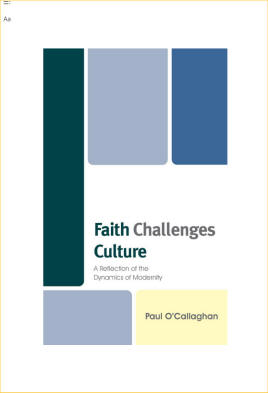Catholic Medical Quarterly
Book Review
Faith challenges culture: A reflection of the Dynamics of Modernity
By Paul O’Callaghan. Lexington Books
Reviewed by Dr Pravin Thevathasan
 The
author is professor of theological anthropology at the Pontifical
University of the Holy Cross. He has written an inspiring work on the
relationship between Christianity and modernity. One of the questions
asked is: is modernity intrinsically hostile to religion? The author
argues that it is not.
The
author is professor of theological anthropology at the Pontifical
University of the Holy Cross. He has written an inspiring work on the
relationship between Christianity and modernity. One of the questions
asked is: is modernity intrinsically hostile to religion? The author
argues that it is not.
In actual fact, says the author, what we refer to as Western civilisation is rooted in Christianity. He examines some of the elements in our culture that come directly from Christianity: rationality, freedom, equality and what he refers to as conquest.
Let us examine rationality. The author notes that faith and reason are not in conflict. They complement each other. Pope Benedict made the same point, as is well known. Faith without reason leads to fundamentalism. Reason without faith leads to secularism. When we examine freedom, rejection of Christianity leads not to freedom but to licence. One fears that the principle of autonomy as applied in current medical ethics is no more than that: the right to do whatever one wants even if the decision is unwise. Equality without faith leads to reductive egalitarianism and conquest without faith leads to rapine.
Our understanding of the intrinsic value of every human being comes from the Judaeo-Christian tradition. The same holds for other values such as freedom, equality and the sanctity of marriage. While there is much to admire in the Ancient Greek pagan culture, there can be no doubt that paganism held that only certain human beings had a right to life. Dignity is not a given, it is something humans must earn.
The author argues that there is no such thing as a purely Christian culture. I am not so sure: the papal espousal, at least before the Second Vatican Council, of the reign of Christ the King appears to contradict this. What can surely be said is that no society has practiced Christian principles in their entirety.
Modernity, says the author, is not incompatible with Christianity. The author examines the works of Tom Holland, Romano Guardini and T S Eliot to argue his point. Such things as respecting conscience, human rights and democracy all come from Christianity.
Sadly, the Christian roots of Western culture are being increasingly rejected or ignored. Modernity without Christianity has tended towards radical scepticism. Surely to the point when we can no longer define what is meant by man or woman!
The Christian tradition promotes freedom. But it is the freedom of God's children, for freedom grows as we practice the virtues. How different this is from a secularist understanding of freedom. Equality in the Christian tradition is accepting of our dependence on others. Modernity without Christianity claims that any form of dependency lessens human dignity. When the author speaks of conquest, he is reminding us that all things are from God. We are receivers of these gifts. Our response should be one of gratitude. A word frowned on by modernity without Christianity.
The author has successfully demonstrated that the values we hold in our culture come from Christianity
